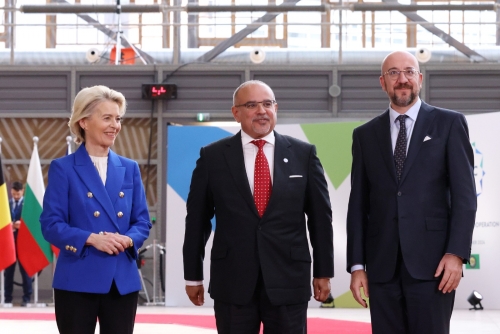The EU-GCC inaugural summit in Brussels marked a significant milestone in establishing a strategic partnership and fostering cooperation among member states. High-ranking officials, including Charles Michel and Sheikh Tamim bin Hamad bin Khalifa Al Thani, emphasized the importance of collaboration in addressing regional challenges and promoting stability, prosperity, and unity. The summit aimed to develop a roadmap for future cooperation, particularly in light of ongoing crises in the region. Ursula von der Leyen highlighted the need for security and diplomacy to support economic investment and achieve sustainable pathways.
Sheikh Tamim bin Hamad bin Khalifa Al Thani reiterated the GCC’s commitment to investing in trade and combating climate change, with trade volume between the EU and GCC reaching $204 billion. He addressed security and political challenges in the Middle East, emphasizing the importance of standing with the EU at this critical moment. Additionally, he urged for the establishment of a sovereign Palestinian state, an immediate ceasefire in Gaza and Lebanon, and Israeli withdrawal from the West Bank.
Ursula von der Leyen emphasized the interdependence of economic investment, security, and diplomacy in the region. She stressed the need for civilian protection and diplomacy to achieve sustainable pathways, highlighting that regional stability is essential for achieving sustainable goals. H.E. Jasem Mohamed AlBudaiwi, Secretary General of the Cooperation Council for the Arab States of the Gulf, reported on the significant direct investments exceeding $100 billion and reaffirmed the GCC’s call for a ceasefire in Gaza and efforts to maintain maritime security.
Representatives from Bahrain, including His Royal Highness the Crown Prince and Prime Minister Salman bin Hamad Al Khalifa, attended the summit to strengthen ties with Belgium and the EU. Discussions focused on enhancing cooperation on global challenges, economic collaboration, energy sustainability, and people-to-people contact. The agenda included specific joint activities to deepen cooperation in areas such as trade, climate change, green transition, and counter-terrorism.
Overall, the EU-GCC summit in Brussels highlighted the commitment of both regions to strategic partnership and collaboration in the 21st century. The discussions and initiatives outlined during the summit aim to address regional challenges, enhance economic cooperation, and promote stability and unity among member states. The leaders emphasized the importance of working together to achieve common goals and tackle pressing issues facing the region. The summit served as a platform for dialogue and cooperation to pave the way for a more prosperous and secure future for both the EU and GCC.











